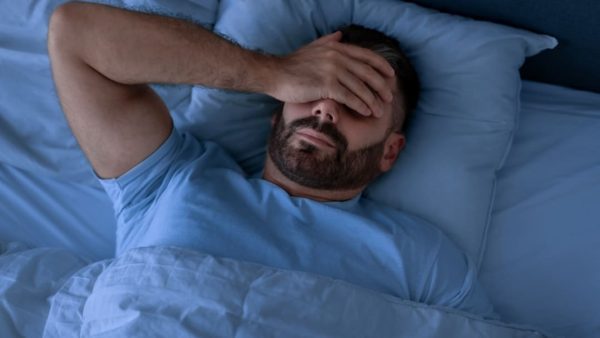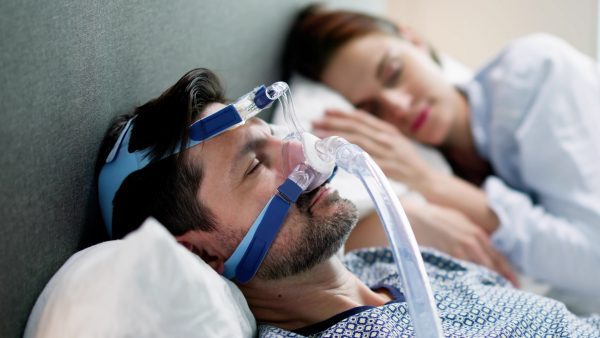Looking for Expert-Level VA Claim Answers?📱Call Us Now! 737-295-2226
Veterans with sleep apnea can receive VA disability ratings of 0%, 30%, 50%, or 100%—with most veterans earning a 50% rating for using a CPAP machine.
But your rating isn’t automatic. Your rating depends on the severity of your symptoms, your medical evidence, and how your condition connects to military service.
In this guide, you’ll learn the current sleep apnea VA rating chart, proposed rule changes, and proven strategies to strengthen your claim or rating increase.
Summary of Key Points
- Sleep apnea is rated under Diagnostic Code 6847 in Title 38, Chapter 1, Part 4 of the US Code of Federal Regulations.
- The most common rating is 50%, typically granted for veterans who use a CPAP or BiPAP machine.
- Proposed rule changes would eliminate the automatic 50% rating for CPAP use and remove the 30% rating entirely
- Your best chance of winning a sleep apnea claim is often to file it as secondary to another service-connected condition.
- Veterans are nearly 4x more likely to develop sleep apnea than non-veterans, making it a commonly claimed condition.
Table of Contents
Sleep Apnea VA Disability
Sleep Apnea is a VA disability rated under Diagnostic Code 6847, Sleep Apnea Syndromes (Obstructive, Central, Mixed).
The most common rating for sleep apnea is 50%, which requires the use of a breathing assistance device such as a Continuous Positive Airway Pressure (CPAP) machine.
Many veterans develop sleep disorders after service due to PTSD, chronic pain, or respiratory exposure. Common signs include snoring, gasping for air during sleep, or feeling exhausted during the day—even after a full night’s rest.
How the VA Rates Sleep Apnea
Pursuant to Diagnostic Code 6847, VA disability ratings are as follows:
- A 0% rating is warranted if you’re asymptomatic (no symptoms) but with documented sleep disorder breathing.
- A 30% rating is warranted if you have persistent daytime hypersomnolence but do not require the use of a breathing device.
- The 50% rating is warranted if you require the use of a breathing assistance device such as a Continuous Positive Airway Pressure (CPAP) or Bi-level Positive Airway Pressure (BiPAP)
- A 100% rating is warranted for chronic respiratory failure with carbon dioxide retention or cor pulmonale or requires tracheostomy.
Sleep Apnea VA Rating Chart
Ratings are assigned under diagnostic code 6847, Sleep Apnea Syndromes (Obstructive, Central, Mixed):
DC 6847, Sleep Apnea Syndromes (Obstructive, Central, Mixed): | VA Rating (%) |
| Chronic respiratory failure with carbon dioxide retention or cor pulmonale or requires tracheostomy | 100% |
| Requires use of a breathing assistance device such as a CPAP machine | 50% |
| Persistent daytime hypersomnolence | 30% |
| Asymptomatic but with documented sleep disorder breathing | 0% |
Is the VA Changing How It Rates Sleep Apnea?
Yes, there are proposed changes to how the VA rates sleep apnea.
The new VA ratings would be 0%, 10%, 50%, and 100%.
The biggest change would be the ending of the “automatic” 50 percent rating if a veteran requires the use of a breathing device (CPAP machine).
The 30% rating would also be reduced to 10%.
Related: Proposed VA Sleep Apnea Rating Changes
| DC 6847, Proposed Changes to VA Sleep Apnea Ratings: | VA Rating |
| Sleep apnea with ineffective treatment (as determined by sleep study) or unable to use treatment due to comorbid conditions; and with end-organ damage | 100% |
| Sleep apnea with ineffective treatment (as determined by sleep study) or unable to use treatment due to comorbid conditions and without end-organ damage | 50% |
| Sleep apnea with incomplete relief (as determined by sleep study) with treatment | 10% |
| Asymptomatic with or without treatment | 0% |
NOTE: Qualifying comorbidities are conditions that, in the opinion of a qualified medical provider, directly impede or prevent the habitual use of a recognized form of treatment shown by sleep study to be effective in the affected veteran’s case ( e.g., contact dermatitis where the mask or interface touches the face or nares, Parkinson’s disease, missing limbs, facial disfigurement, or skull fracture).
-
Pro Tip: If you already have a VA rating for sleep apnea, you are “grandfathered in” at your current VA rating, regardless of the changes.
How to Service Connect Sleep Apnea
>> View our new post: How to connect sleep apnea to military service
The VA only rates conditions that were caused or made worse by your military service. This is known as service connection. Proving service connection can be the hardest part of the VA claims process for many veterans. To do so, you need these three things:
- A current medical diagnosis. The VA can’t rate a condition that a qualified medical professional hasn’t formally diagnosed.
- Evidence of an in-service event, injury, or illness. You need to have evidence that something happened during and because of your service that caused your disability or made it worse.
- A medical link between #1 and #2. Does the medical evidence suggest that your in-service event, injury, or illness is most likely the cause of your sleep apnea?
If you’re having trouble proving service connection, following the four steps below could help:
To win a VA claim, you must prove your condition was caused or worsened by military service.
Step 1: Obtain a New Sleep Study: Complete a recent sleep study (within the last 12 months) to confirm a current diagnosis and document symptom severity.
Step 2: Confirm a Medical Diagnosis: Have a VA or private sleep specialist officially diagnose you with sleep apnea (obstructive, central, or mixed).
Step 3: Obtain a Nexus Letter: A medical nexus letter from a qualified provider establishes a connection between your condition and your service (or rated condition)—crucial for approval.
Step 4: Consider Secondary Service Connection: If your condition developed because of PTSD, sinusitis, or another rated condition, file it as secondary rather than direct service connection.
Sleep Apnea Secondary to Other Conditions
Secondary service connection applies to secondary conditions. These are conditions that are caused or made worse by a disability that’s already rated by the VA.
For example, if sinusitis is causing your sleep apnea and you have a sinusitis VA rating, you could be eligible for a VA rating for sleep apnea secondary to sinusitis.
The only difference between regular service connection and secondary service connection is part two of the Caluza triangle: Evidence of an in-service event, injury, or illness.
Pro Tip: If you’re claiming secondary service connection, your primary disability that’s already rated by the VA serves as your in-service event, injury, or illness.
Sleep Apnea Nexus Letters
Trying to get a Nexus Letter to help you get service-connected?
You’re in the right place!
Veterans who become members of the VA Claims Insider Elite program get access to a network of independent medical providers who can write Nexus Letters at reduced rates.
Why pay $1,500 to $2,000 for a Nexus Letter when you can get one for 60-70% OFF?
Click HERE to speak with an expert now (no risk, no obligation, no high-pressure sales tactics).
Common Links for Secondary Service Connection
In my experience, an upper respiratory disability is one of the most common links.
Both sinusitis and rhinitis are linked to sleep apnea. If you have sleep apnea and sinusitis/rhinitis, your next step would be to get a doctor’s medical opinion supporting that your service-connected sinusitis or rhinitis caused or aggravated your sleep apnea.
This may be even easier for you now because of a recent VA rule as of August 2, 2021. Thanks to additions to the VA presumptive list, you may be able to presumptively service-connect rhinitis, sinusitis, rhinosinusitis, or asthma if you served in particular theaters during specified time periods.
This opens doors for many veterans who were unable to service-connect these respiratory conditions previously.
EXAMPLE: Sleep Apnea Secondary to PTSD
Research shows that combat veterans with PTSD may be at higher risk for sleep apnea than the general population. Both disorders have risk factors that affect both sleep apnea and symptoms of PTSD, and the conditions can aggravate each other.
A study conducted by the VA Healthcare System for San Diego and National Center for PTSD found that between 40 percent and 98 percent (!) of veterans with PTSD also have a co-occurring sleep disturbance, including obstructive sleep apnea (OSA).
If you’re dealing with sleep apnea as a secondary condition to PTSD, you aren’t alone!
PTSD—and the side effects of medications taken to address PTSD—can lead to the development of sleep apnea in a few different ways. PTSD is well-known for causing sleep deprivation, chronic stress, and an increase in body mass or obesity due to prescribed medications. All of these can contribute to sleep apnea. For more information on conditions that can cause or aggravate sleep apnea, check out our post 10 Most Common Sleep Apnea Secondary Conditions (The Ultimate Guide).
C&P Exam (What to Expect)
A C&P exam for Sleep Apnea might involve a physical examination and review of your medical history and severity of symptoms over time.
Most veterans applying for a sleep apnea VA rating will complete a Compensation & Pension (C&P) exam.
The VA uses this exam to confirm your diagnosis, evaluate symptoms, and determine how your condition affects work and daily life.
During your exam, explain clearly:
- How often your symptoms occur and how they affect your energy or focus
- Whether you use a CPAP or BiPAP machine
- If your sleep apnea makes it difficult to work, drive, or stay awake during the day
The C&P examiner’s report heavily influences your final VA rating, so be specific and honest.
Read our full guide on how to prepare for a Sleep Apnea C&P exam
Why So Many Veterans Develop Sleep Apnea
According to VA research, veterans are nearly four times more likely than civilians to develop sleep apnea.
Why? A mix of physical and psychological factors from service life:
- PTSD and stress: Mental health conditions can disrupt sleep patterns and increase the risk of obstructive sleep apnea.
- Chronic pain and limited mobility: Weight gain or reduced activity due to service-connected injuries can contribute to breathing problems at night.
- Environmental exposure: Dust, smoke, and burn pits can cause long-term respiratory issues like sinusitis or rhinitis—both linked to sleep apnea.
These connections make sleep apnea one of the most commonly claimed VA disabilities today.
Conclusion
Sleep apnea doesn’t just affect your sleep—it can impact your health, relationships, and ability to work. The good news is that the VA recognizes sleep apnea as a rateable condition under Diagnostic Code 6847, meaning you may qualify for monthly, tax-free disability compensation.
If you’re preparing a new claim or appealing a low rating, understanding how the VA assigns your sleep apnea VA rating (and backing it up with strong medical evidence) can make all the difference. Don’t leave compensation and benefits on the table. Get informed, get connected, and get the rating YOU DESERVE.
Tired of Fighting the VA Alone? WE GOT YOUR SIX!
- VA Claims Insider is the most trusted name in VA disability claims.
- Work directly with a VA claims coach who can educate you through the claims process.
- 25,000+ disabled veterans have served in our membership programs since 2016.
- 30% average rating increase for veterans who complete our Elite program.
- 4.7/5.0 average rating out of 5,500+ total reviews; over 4,500 5-star reviews.
FAQs | Frequently Asked Questions
What is the VA disability percent for sleep apnea?
The VA disability percent for sleep apnea is 0%, 30%, 50%, or 100%, depending on severity of symptoms. However, it’s important to note there are proposed changes to how the VA rates sleep apnea. The new (proposed) sleep apnea VA ratings would be 0%, 10%, 50%, and 100%. The biggest change would be the ending of the “automatic” 50 percent rating for sleep apnea if a veteran requires the use of a breathing device (CPAP machine).
Can I get VA disability for mild sleep apnea?
Yes, as long as you can prove service connection for your sleep apnea (e.g., your sleep apnea is related to your active duty service), you can qualify for a sleep apnea VA rating of 0%, 30%, 50%, or 100%.
How many types of sleep apnea are there?
The VA recognizes three types of sleep apnea: Obstructive Sleep Apnea (OSA), Central Sleep Apnea (CSA), and Complex or Mixed Sleep Apnea. OSA is the most common and occurs when the throat muscles relax too much during sleep, blocking the airway—often causing loud snoring, gasping, and daytime fatigue. CSA happens when the brain doesn’t send proper signals to the muscles that control breathing, leading to pauses in breathing without a physical blockage. Complex or Mixed Sleep Apnea is a combination of both OSA and CSA, often emerging during or after CPAP treatment.
What kind of CPAP machine does the VA use?
The VA may prescribe a basic CPAP (constant pressure), a BiPAP (different pressures for inhale/exhale), or an auto-CPAP that adjusts throughout the night. However, having a CPAP alone isn’t enough to get service-connected—you still need medical evidence linking your sleep apnea to your service.
Is a CPAP machine the only treatment for sleep apnea?
No. Sleep apnea treatment depends on the type and severity of the condition. Before or in addition to CPAP therapy, lifestyle changes such as diet, exercise, and stress reduction may be recommended. Some veterans with sleep apnea may experience improvement with lifestyle changes, but CPAP therapy is still among the most common treatments.
Can the VA take away my sleep apnea VA rating?
Yes, the VA can reduce your rating if they determine your symptoms have improved—typically after a re-evaluation 2–5 years post-rating. However, ratings are less likely to be reduced if your condition is permanent, static, stabilized (unchanged for 5+ years), you’re over 55, or you’ve had the rating for 20+ years. The VA must review your full medical history, find sustained improvement, and give advance notice before making any reduction.
Will veterans lose their current sleep apnea rating if the rules change?
No. If you already have a VA disability rating for sleep apnea, your rating will be grandfathered in—even if the new criteria would result in a lower rating today.
Do I need a sleep study for a VA sleep apnea claim?
Yes. A current sleep study is typically required to confirm the diagnosis and severity of your condition. The VA may deny your claim without one.
Does the VA rate sleep apnea even if I don’t snore?
Yes. Snoring is common, but not required. If a sleep study confirms a diagnosis and you meet the rating criteria, you may still qualify—even without snoring.
Can I get VA disability for central or complex sleep apnea?
Yes. The VA rates all three types—obstructive, central, and complex—under the same diagnostic code (6847), based on symptom severity and treatment needs.
Can sleep apnea be service-connected as a secondary condition?
Yes. Many veterans win sleep apnea claims by linking it to a service-connected condition like PTSD, sinusitis, or asthma, for example.
Can I still get a sleep apnea VA rating without a CPAP?
Yes. The VA may still grant a rating if a sleep study confirms sleep apnea, even if you aren’t prescribed or using a CPAP. Ratings depend on symptom severity and medical evidence, not just device use.
Will I lose my 50% sleep apnea rating under the new rules?
No. Veterans already rated for sleep apnea before any rule change will keep their current rating (“grandfathered” in).
What are the most common symptoms of sleep apnea in veterans?
The main symptoms include loud snoring, choking or gasping during sleep, and extreme daytime fatigue. Many veterans also report waking up with a dry mouth or headache and noticing their symptoms worsen alongside PTSD, sinusitis, or chronic pain.
Additional Guides and Resources
You might also like the following blog posts:
HUGE Sleep Apnea Rating Changes Are Coming
How to Connect Sleep Apnea to Military Service
When are the VA Sleep Apnea Changes Taking Place?
How to Service Connect Sleep Apnea secondary to PTSD
Do I Need a Spousal Letter to Support My Sleep Apnea VA Claim?
Content Reviewed By

Quality Assurance Team
The Quality Assurance (QA) team at VA Claims Insider has extensive experience researching, fact-checking, and ensuring accuracy in all produced content. The QA team consists of individuals with specialized knowledge in the VA disability claims adjudication processes, laws and regulations, and they understand the needs of our target audience. Any changes or suggestions the QA team makes are thoroughly reviewed and incorporated into the content by our writers and creators.
About the Author

Brian Reese
Brian Reese is a world-renowned VA disability benefits expert and the #1 bestselling author of VA Claim Secrets and You Deserve It. Motivated by his own frustration with the VA claim process, Brian founded VA Claims Insider to help disabled veterans secure their VA disability compensation faster, regardless of their past struggles with the VA. Since 2013, he has positively impacted the lives of over 10 million military, veterans, and their families.
A former active-duty Air Force officer, Brian has extensive experience leading diverse teams in challenging international environments, including a combat tour in Afghanistan in 2011 supporting Operation ENDURING FREEDOM.
Brian is a Distinguished Graduate of Management from the United States Air Force Academy and earned his MBA from Oklahoma State University’s Spears School of Business, where he was a National Honor Scholar, ranking in the top 1% of his class.



